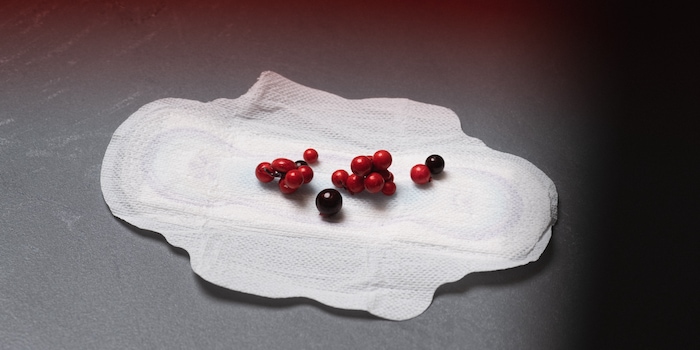
Background information
Women's body knowledge gap: Seven facts about the female breast
by Olivia Leimpeters-Leth

To err is human; as is to bleed. But what you think you know about female menstruation is often nothing more than hot air. Time to fact check five misconceptions about menstruation.
In total, women bleed for seven long years during their lifetime. Obviously, we’re talking about periods. Something some consider women’s «dirty little secret». In an international study conducted by the humanitarian organisation Plan International, 4,127 boys and young men were asked about their attitudes toward female menstruation.
The alarming result: «dirty», «embarrassing» and «disgusting» were the respondents’ most frequent associations with the female period. In addition, 37 per cent of respondents believed that menstruation is a private matter for women and should not be discussed by them, but kept secret. So what does that mean? Stick your tampon in and shut your mouth?
With all due respect, I’m going to do the exact opposite. Taboos need to be put on the table, not left in women’s panty liners. (Even if periods are sometimes annoying and terribly painful; particularly if you suffer from conditions such as endometriosis). So welcome to debunking some of the most common menstruation misconceptions.
This is important to know for both him and her: even if you are menstruating, you can definitely get pregnant. Although the probability of pregnancy is low, it’s not zero.
How come? Because a woman’s body prepares for a possible pregnancy every month. For this purpose, eggs mature in the ovaries and make their way down the fallopian tube to the uterus, where they wait to be fertilised. The woman then ovulates, which rings in her fertile days. If the egg is fertilised by a sperm, it nestles into the lining of the uterus. However, most months, the egg waits in vain to be fertilised. If that’s the case, the body breaks down the mucous membrane and excretes it as menstrual blood. And the cycle begins all over again.
Ovulation gives women a window of roughly six fertile days every month. However, the time of ovulation may vary from cycle to cycle – and with it the fertile window. On average, a cycle lasts between 21 and 35 days. In other words, the 28-day cycle is more the average than the norm and applies to only 16 per cent of all women, according to a study published in the Journal of Medical Internet Research.
Then there’s the fact that sperm can survive in the female body for up to five days. This extends the time in which fertilisation can occur through sex. This means that having sex during the last days of menstruation coupled with an early following ovulation can therefore definitely lead to pregnancy.
There aren’t many bright sides to periods. But sex can be one of them. A strong argument in favour of it is your sex drive. It’s known to peak during ovulation due to a surge in oestradiol, the main oestrogen of sexually mature women. Oestradiol is also particularly high in some women during their periods, as the portal Go Ask Alice explains. The platform is operated by health experts at Columbia University. These experts say that an increased libido during your period isn’t unusual. What’s more, period blood serves as a natural lubricant, which can make sex even more pleasurable.
In addition, an orgasm can also relieve period cramps, as it stimulates circulation and makes the brain produce lots of dopamine and other endorphins. They’re famous for making you happy and acting as natural painkillers. Lastly, sex during your period can shorten bleeding. This is because the muscles in your uterus contract during an orgasm, helping the body to expel blood more quickly.
Although this statement isn’t totally wrong, it’s not telling the whole truth either. During menstruation, blood is excreted, but not exclusively. Most menstrual blood consists of old tissue and remnants of the uterine lining that has built up during the cycle. That’s why the colour of your period discharge isn’t always just red, but can also be brownish. Among other things, it’s a question of oestrogen levels. Together with other hormones, it controls the woman’s entire cycle. Generally speaking, the darker the blood, the more oestrogen is involved.
But the colour of your menstrual blood also says a lot about your health. For example, a pale red may indicate an iron deficiency. To get an overview of what the colour of your period blood might mean for your health, see the health magazine Medical News Today.
This is probably your mind playing tricks on you. In reality, most women only lose about 20 to 60 millilitres of blood every month – the equivalent of an espresso cup.
It’s only if you lose 100 millilitres or more it’s considered heavy bleeding. With an average of 500 cycles in 38 fertile years, a woman will lose around 30 litres of blood (page in German) through her period in her life. One espresso cup at a time, this does add up to many litres of blood. But in very small units and, as mentioned above, spanning a total of about seven years of being on your period.
Having said that, these small amounts of blood are enough to make women worldwide hurtle into anaemia. The condition is preceded by a deficiency of the trace element iron, which the body needs to form red blood cells. Each millilitre of blood contains one milligramme of iron; the exact amount we normally ingest daily through our food. This has been revealed by a study in Perspectives in Medicine. To recap: in the «best» case, a woman will lose 20 milligrammes of iron during each period.
According to a study in the journal Clinical Nutrition and Metabolic Care, «Iron deficiency is more likely in women of reproductive age because of menstrual blood loss.»
The thought is beautiful. Two women who spend a lot of time together will have synchronised cycles. Blood sisters and fellow sufferers surfing the red wave together. Granted, this theory is magical, but it turns out to be a myth. The study that allegedly proved this was botched.
We have the U.S. psychologist Martha McClintock to thank for the idea of cycle synchronisation. In 1971, she based her hypothesis on monitoring women living together in college dorms and came to the following conclusion: cycle synchronisation is controlled by pheromones, i.e. certain messenger substances. However, her thesis was later discarded after other researchers found the study’s design, method and statistics to be sloppy in parts.
Nevertheless, the likelihood that your cycle will overlap with your best friend’s at some point is still relatively high. Since the female cycle shifts monthly, you’ll probably menstruate together at some point – even if only temporarily. It’s a light at the end of the cycle – after all, a sorrow shared is a sorrow halved.
Header image: Thomas Kunz
I'm a sucker for flowery turns of phrase and allegorical language. Clever metaphors are my Kryptonite – even if, sometimes, it's better to just get to the point. Everything I write is edited by my cat, which I reckon is more «pet humanisation» than metaphor. When I'm not at my desk, I enjoy going hiking, taking part in fireside jamming sessions, dragging my exhausted body out to do some sport and hitting the occasional party.
Interesting facts about products, behind-the-scenes looks at manufacturers and deep-dives on interesting people.
Show all